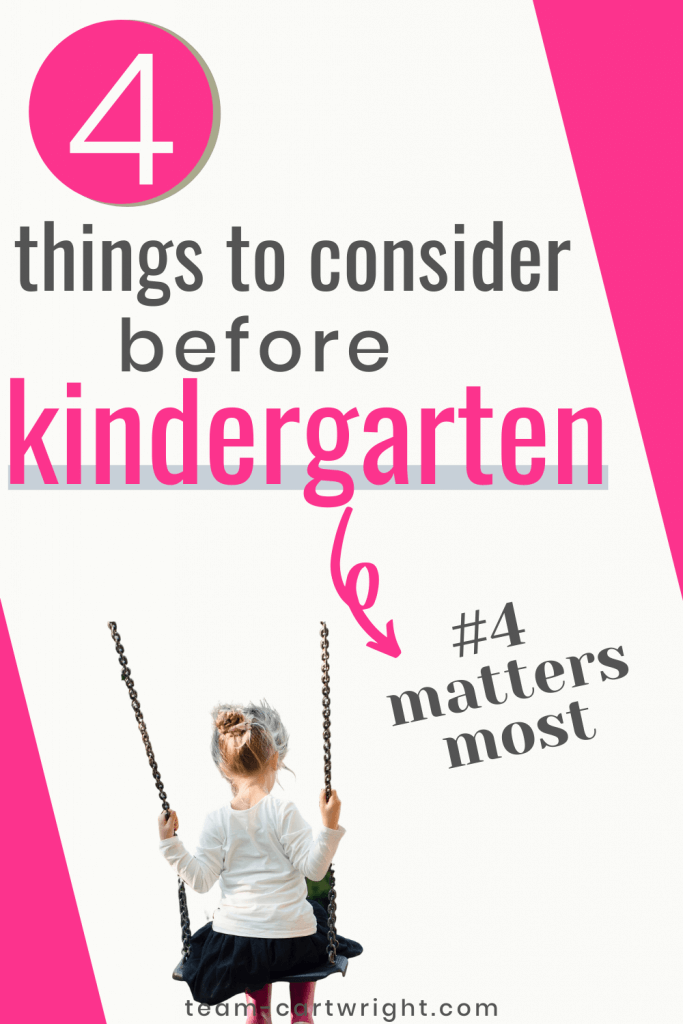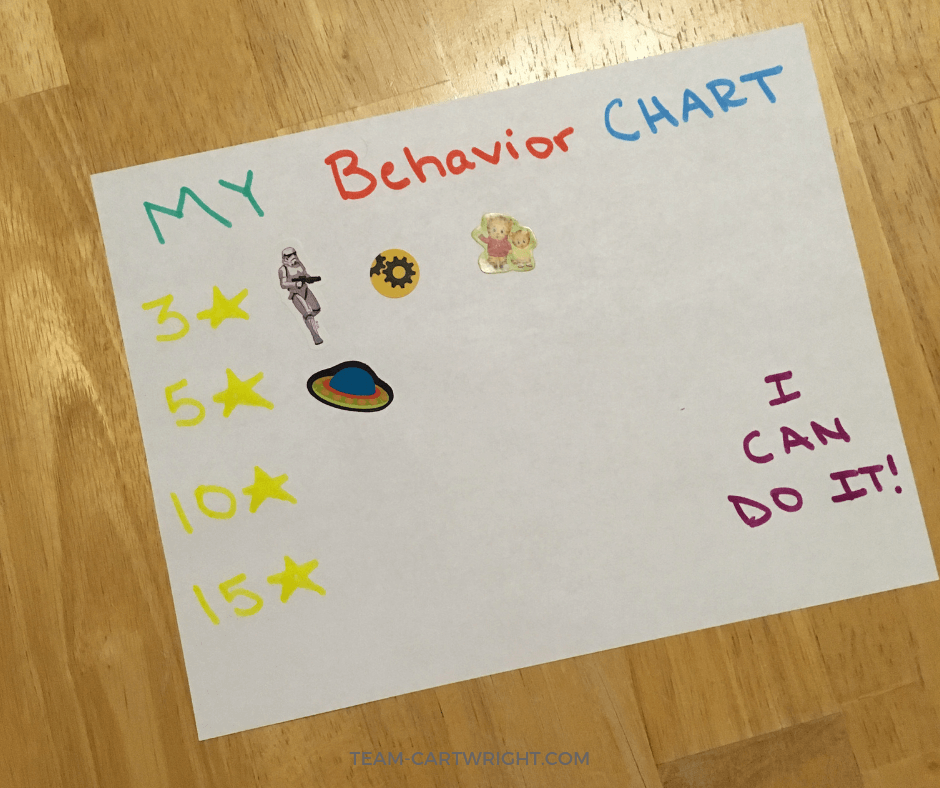Redshirting Kindergarten: Why we are waiting until 6 to start.
I never thought too hard about the implications of late summer birthdays until I was pregnant with Ben. He was due in late August, so an end of summer birthday. This meant we might have to make a big decision.
Do we have our child start kindergarten as a fresh 5-year-old, or do we do an extra year of preschool, delaying kindergarten, and start Ben a year older, at 6? It’s a lot to think about.
We are not alone in facing this decision, and we put a lot of thought into it. Here is what we decided about redshirting kindergarten.

What's In This Post?
What is Redshirting?
Redshirting is a term for holding a child back a year in school. It’s actually a term used in college football when coaches keep a freshman back from playing for a year. They hold onto that year of eligibility but have time to improve their skills.
Academic redshirting is holding students back in school. They have more time to develop mentally and emotionally and will be one of the older students, if not the oldest student, in their class.
For kindergartners, it means not starting a child in kindergarten until they are 6-years-old. So they start school one year late and will be 7 in first grade, 8 in second, etc.
Redshirting is most commonly done with children who have birthdays at the end of summer, right before the school year starts. They technically turn 5 by the cutoff date for kindergarten entry, but instead, their parents decide not to send them.
Redshirting Kindergarten Pros and Cons
Why would you want to hold your child back? There are some very good reasons for academic redshirting, and there are some very good reasons why you would not want to do so.
Pros of Holding Your Child Back
The pros are pretty clear. Your child has more time to develop and will be among the older kids in his or her class. Your child will have more time to develop academically, emotionally, and physically. There are some real advantages to that.
Being older means your child might have more confidence and self-esteem, which can lead to success for them. They also have an early advantage in athletics, as older children tend to be more developed in terms of physical ability. And they are just bigger, which can be a big pro in some sports.
Overall the children who start kindergarten later tend to have more maturity and are just better able to face the challenges ahead of them.
Cons of Holding Your Child Back
This isn’t a perfect situation, there are some cons to consider as well.
Being older does not mean that your child will always be smarter or faster or the best at things in school. They might never be, and being older might put pressure on them that is unnecessary.
Your child will always be older than a lot of their peers. As older kids, they may have a hard time relating to younger friends, especially in middle school. Yep, you need to consider puberty for your soon to be kindergartner. Being one of the older peers means your child might be one of the first to develop, that can be hard.
Keeping your child back for academic reasons can be tricky. 5 and 6 are so young to predict academic success. Does your child really need time to develop mentally and handle the school work, or are they just not interested/motivated because they are so young?
Overall you need to remember that being older lasts all through schooling. It might be an advantage to be almost a year older than the other students in kindergarten, but will it be helpful in a few years? What about in high school?
(Check out this post to get more pros and cons—> Pros and Cons of Redshirting)
Boys vs Girls
Another consideration is the difference between boys and girls. No, we don’t want to get sexist here, but there are some different considerations between the sexes.
We are speaking in generalities here, you never know what will be the case for your child. And yes, some of these things are issues with society that need fixing. But when we were making this decision we had to take into account what is in the world we live in, not just what we wanted to be.
Boys tend to do well with redshirting. It is beneficial for them to be older and bigger. Sports are a big confidence booster for boys and developing first physically helps with that.
Girls might have a harder time if they are among the first to develop physically. Again, this might not be fair, but it is something to keep in mind. They are more likely to be the first of their friends to develop breasts and get their periods. That can be challenging.
Girls tend to mature emotionally earlier than boys. So boys might do well being older than their peers, they have more time to hit maturity milestones. A girl might have a hard time with emotional maturity at age 5, but is she going to jump ahead as she gets older and be unable to relate to her peers in middle or high school?
I know no one can predict the future, but these are things to think about.
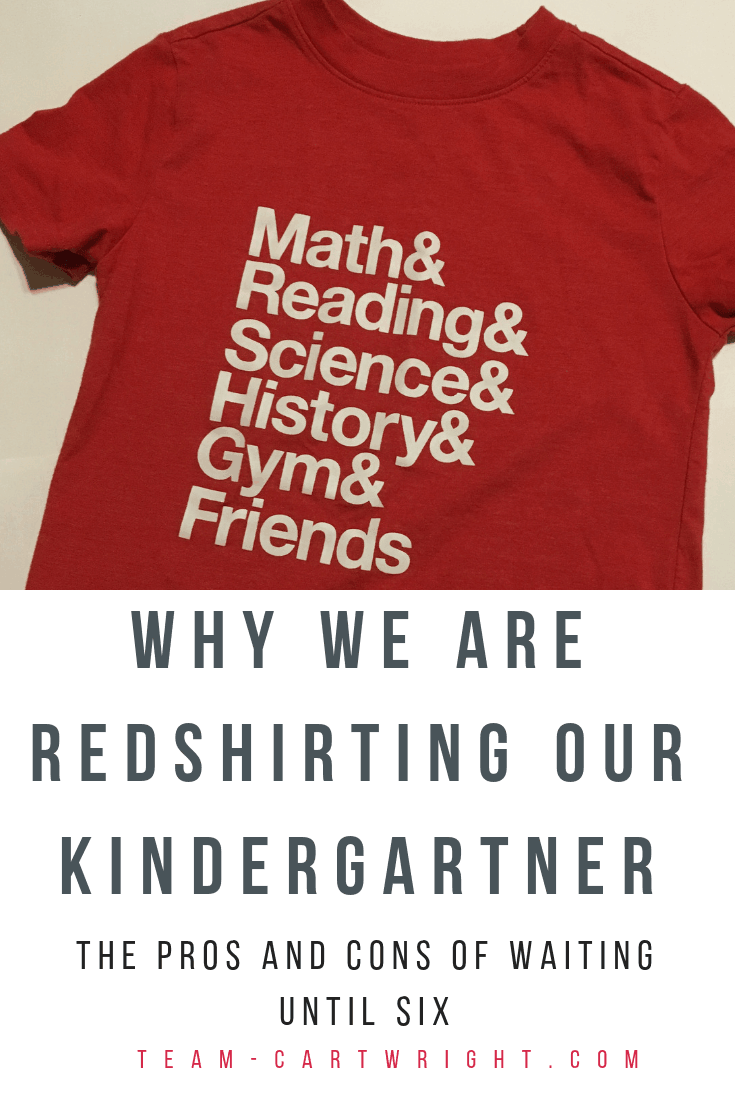
Our Decision to Redshirt Our Kindergartener
We are redshirting Ben. Of course, I don’t think of it that way. It isn’t a decision to create unfair advantages, but one to help Ben. Our goal is for him to succeed in his entire schooling career.
So how did we come to this decision? Here is my thought process for our decision.
We Started Thinking About This Early
We started considering this before Ben was even born. Yep, I like to worry about things way before it is necessary.
We knew Ben was going to be a late August baby. I did hope he wouldn’t go late and would be born before September 1st so we could decide his academic path. But I knew this would be something for us to think about.
So you aren’t crazy if you are thinking about redshirting options before your child is about to turn five. It is a big decision.
We Knew Which Way We Were Leaning Early
Even before Ben was born we were leaning towards starting him in kindergarten at 6-years-old. Why? I mean, how could we make this sort of decision about a child before we had even met him?
Quite simply it was because he was a boy. We knew boys tend to do better when they start kindergarten at 6 as opposed to being a brand new 5-year-old. This meant we were open to starting later.
Finally, Pat was teaching kindergarten when I was pregnant with Ben. He saw first-hand kids who started kindergarten having just turned 5 and those who started at 6. In his experience, those boys that started at 6 just had an easier time. They adjusted to school better, got along with their peers better, and overall had more success in kindergarten.
Now I know kindergarten success doesn’t completely predict overall success in school. But it certainly doesn’t hurt if your child’s first year in real school is a good one. Having confidence and feeling positive about school can go a long way in terms of helping kids have successful school years.
Observing Through the Toddler Years
I might sound crazy with this, but I did keep starting kindergarten in mind throughout the toddler years. No, I didn’t take notes or anything, but I did observe Ben and notice how he was developing. And the thought of starting kindergarten at 6 seemed to be a good idea.
We also had a plan in mind in terms of preschool. A lot of kids start preschool at 3, go to PreK at 4, then start kindergarten at 5. Starting at 6 gives you an extra year.
Our original plan after talking to preschool teachers was to start Ben in preschool at 3, do two years of the 3-year-old program followed by PreK and then kindergarten at 6. I liked this plan because he would start preschool at 3, and if through those first two years we felt like he was ready for kindergarten at 5 we could go ahead and enroll him. He would just get a bonus year.
Then life happened, and we ended up moving cross-country right before Ben turned three. By the time we were settled, we couldn’t find a preschool that was liked, was in our budget, and had an opening for Ben to start mid-year.
No worries, we had the bonus year. So he started at 4 and is now in PreK having turned 5 very early in the school year. This worked out so well for us, but I think he would have done well with 3 years of preschool too.
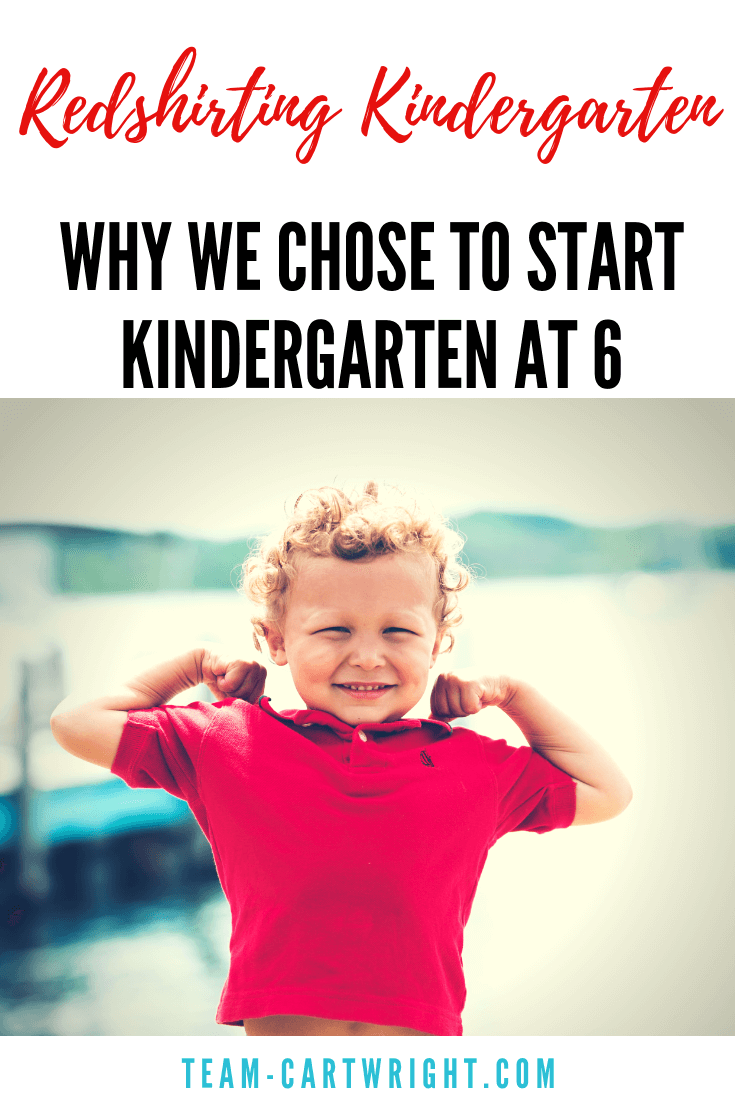
Individual Considerations
For decisions like this, you need to look at each child individually. There were three big areas I looked at with Ben.
Academics
Where was Ben academically? Honestly, he was ready to start kindergarten at 5 in terms of academics. He is a smart kid!
But we aren’t worried Ben will eventually get bored or not be challenged academically. His father is a teacher and I am passionate about learning. I am confident we can find academic challenges for him if needed, so this was not a bad thing that he was ready and would wait to start.
Physical Development
Total honesty here, Ben comes from a long line of people who are not very tall. We’re kind of hobbits. So Ben isn’t likely to be super tall.
Should this matter in life? No. One’s height, that is just a fact of genetics, shouldn’t impact how one is treated. But in the real world, it can become an issue. (Again, brutal honesty here.) It can be hard for boys to be smaller than their peers. If Ben started kindergarten at 5 he would be one of the youngest in his class, making that difference potentially even more pronounced.
Part of me thinks this will build character and be good for him. But is it bad if he could be on the older side and not be the smallest? I don’t think so.
Sports came to mind with this too. We do not expect our children to be star athletes. And we for sure are not starting Ben late thinking he is going to make sports his life. But sports can be an area a lot of kids, boys especially, can gain a lot of self-confidence. And playing sports is great for kids.
There are so many positive life lessons about teamwork, doing your best, losing and winning gracefully and more. We want our kids to experience this and have a chance at competitive sports if they are willing to put in the time and effort.
Not being the smallest would give Ben a better chance to at least be in the pack in terms of sports. He might not be the best, but he has a better chance of not being the worst because he is smaller than the other boys.
Social Skills
It makes sense that older kids have more life experience and better social skills. Making friends is something that all kids need to learn how to do, and starting later would give Ben more time to develop these skills.
But as soon as Ben started preschool his social skills went through the roof. (Of course, this was his first real consistent social peer group, so that helped.) If we had noticed him struggling in this area then starting late would seem like a better idea.
So this was not an issue for us. Preschool gave him the social skills he needed and he has tons of friends. But this is another area to look at and consider in terms of redshirting kindergarten.
Emotional Maturity
This was the big one for us, was Ben emotionally ready for kindergarten? Or would he do better starting at 6?
As I said, girls tend to be more emotionally mature than boys. Starting on the young end of his grade would not help Ben with that. And emotional maturity is something that can’t be taught as easily. I think there are things you can do to work on it, but it isn’t as easy as hiring an academic tutor or working on physical skills.
I think this is the biggest thing parents need to look at. It is much easier to learn if your child can understand the need to sit still. It is much easier to make friends if your child can relate and understand that other people have feelings too. And it is much easier to handle physical developments when your emotional maturity is in the right place.
I don’t want to imply anything bad about Ben, but he tends to be on the younger side in terms of emotional maturity. Nothing we are worried about or think is a problem. We just think he will do better if he started kindergarten at 6.
Our Decision
Our decision to redshirt Ben is already made. He is 5 and he is in PreK. He actually turned 5 about 3 days into the school year, so yes he is the oldest in his class.
I know we made the right decision.
He has no issues academically (which we predicted). He knows his stuff but isn’t yet bored. And as I said I am confident that we can advocate for him and get his needs met academically.
It is a bit early for physical development differences. But he is right there in it when it comes to playing with the other kids. He has always been a cautious kid, and he has the chance to gain even more confidence with things like playground equipment.
As for his emotional maturity, I know we made the right choice. He is getting the chance to work on those skills without the pressure of kindergarten. His preschool teachers and I can work with him on these skills and get him fully ready for the challenges kindergarten will bring.
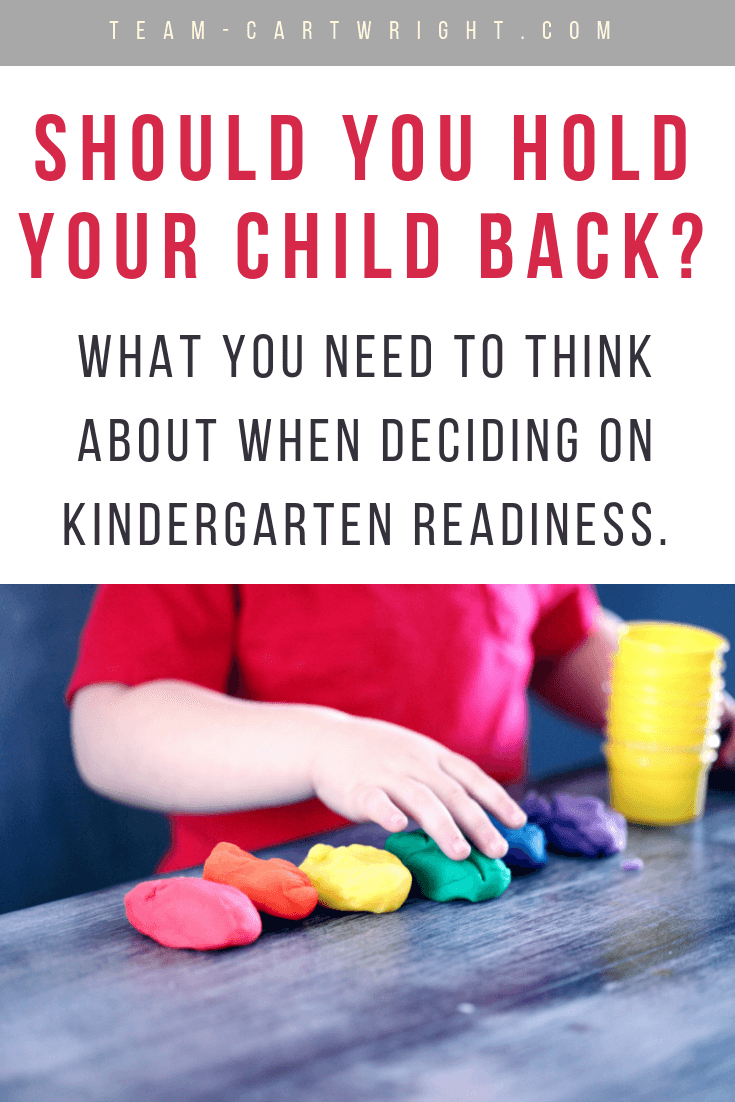
Conclusion
We made the right choice to redshirt our kindergartener. It isn’t a decision to be taken lightly. It is one we thought about for years.
I think we focused on the most important factor, emotional readiness. Ben is at his level by being in PreK, and this helps him succeed in school.
Redshirting is a big decision. Think it through and look at your child as an individual. I am so happy with our choice.

More posts you’ll like!
How To Help Your Frustrated Preschooler
The Best STEM Books for Preschoolers and Kindergartners
Rest Time for Preschoolers: Why it is so important
Redshirting Kindergarten FAQ
Redshirting is a term given when you hold your child back who could start kindergarten and start them a year later. This means your child would turn 5 before the kindergarten cut off date, but you wait and start them when they turn 6 years old instead.
Individual states have different laws in terms of age cut-offs for starting school, but generally, children can start kindergarten when they are 5 years old. They do not have to, but schooling of some sort is compulsory when the child turns 6 years old.
Starting a child at 5 or 6 is a decision that every family should be able to make for their child based off of several factors, including social, emotional, physical, and academic readiness.
The most common timing for redshirting kindergarten is when the child has a birthday in the few weeks to a month before the kindergarten cut off time. There is no specific time period for deciding to hold your child back or not though. Parents need to take a look at their individual child and make the best decision for them.
Being able to start kindergarten early is something that varies from location to location, so you will need to check with your school system to see if that is an option. It is important to look at readiness in terms of social, emotional, academic, and physical readiness.
Along with determining readiness at a young age, parents should also consider future years as that child will always be younger than their peers. That might not have a major impact in elementary school, but it could once puberty hits.
At the kindergarten level, older students (the ones who start closer to 6) do tend to do better than the younger students. Over time this will, of course, balance out. As for long term schooling, there are definitely differences between being the oldest and the youngest in your grade. These differences are something families should consider carefully when deciding whether or not to redshirt their kindergartener.
